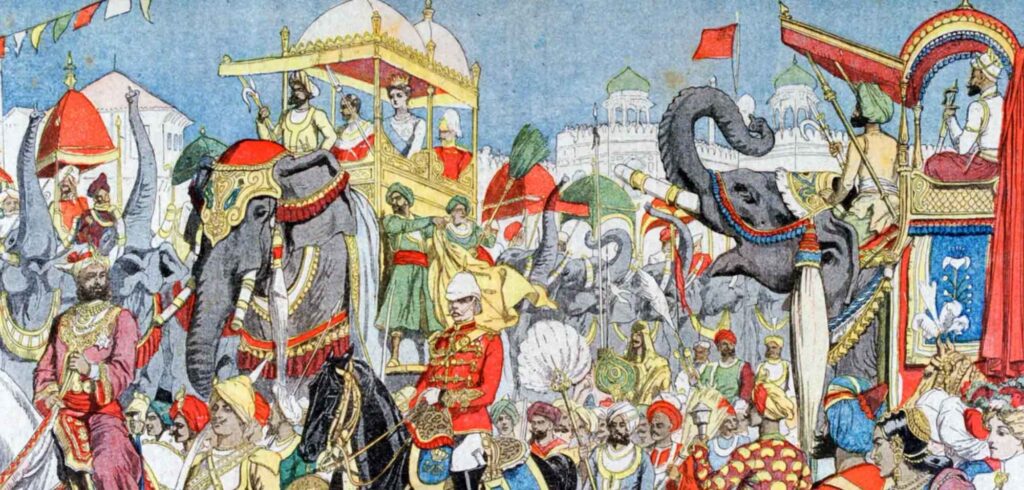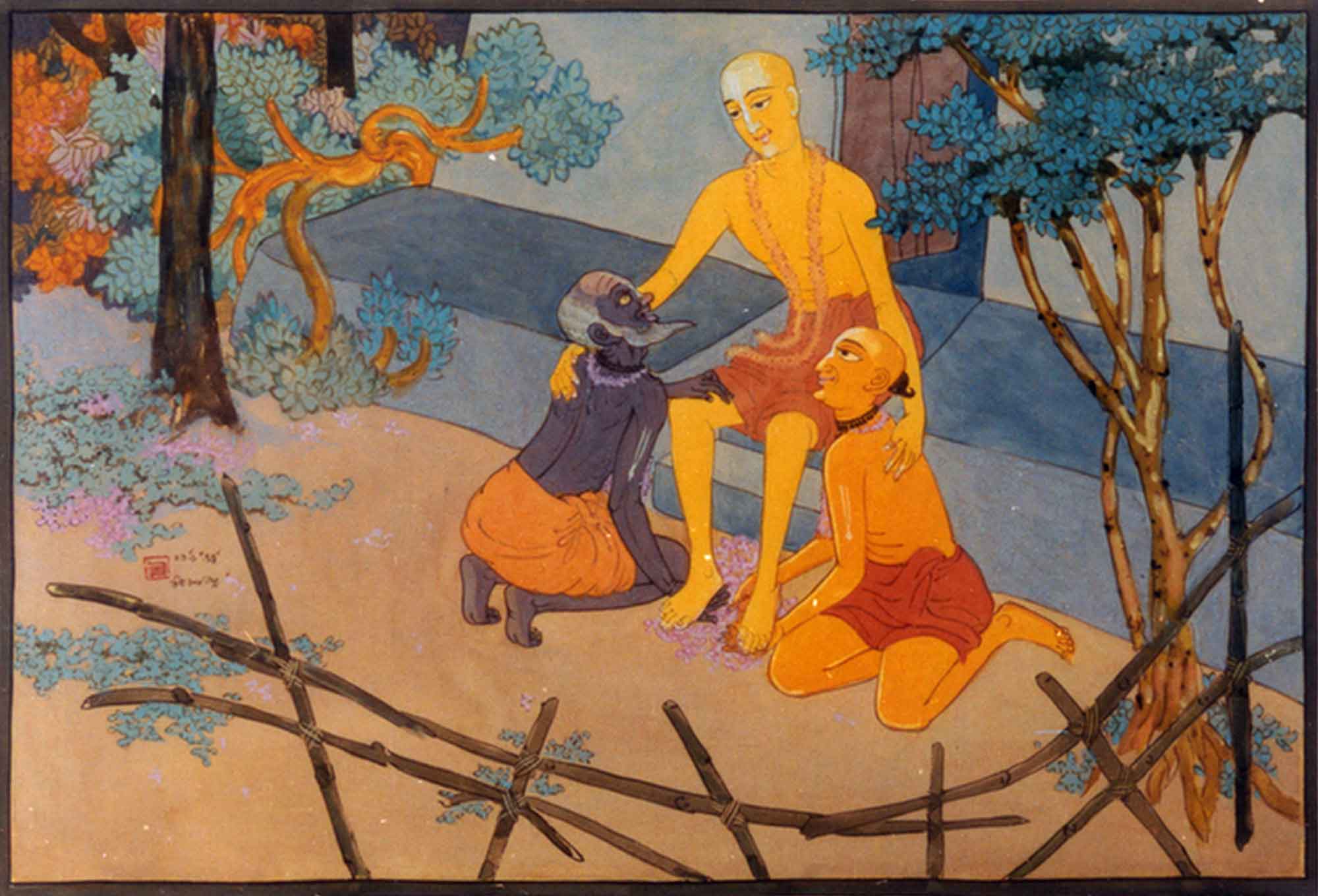Overview
Asat Saṅga (Materialistic Association) was first published in Sajjana Toṣaṇī Vol. 11, issue 6 in 1899. In this article, Bhaktivinoda Ṭhākura specifically defines two types of asat-saṅga, namely the strī-saṅgī (one attached to women) and kṛṣna-abhakta (one who is not a devotee of Kṛṣṇa)
(translated by Swami B.V. Giri)
asat-saṅga-tyāga ei vaiṣṇava-ācāra
strī-saṅgī eka asādhu kṛṣṇābhakta āra
(“The conduct of a Vaiṣṇava is to reject materialistic association such as those who are attached to women, the impious and those who are not devotees of Kṛṣṇa.” – Caitanya-caritāmṛta, Madhya-līlā 22.87)
This is the instruction of Mahāprabhu. The conduct of Vaiṣṇavas at all times and all places is to reject asat-saṅga (materialistic association). Sitting in one place or crossing on a boat is not associating. Any action done with both love and attachment is called association. Loving to discuss mundane topics in bad company is asat-saṅga. Materialists is of two types – strī-saṅgī (one who is attached to women) and kṛṣṇa-abhakta (one who is not a devotee of Kṛṣṇa). Those who love women are called strī-saṅgī. Worldly jīvas absorbed in wealth and women, and those that are lusty after women such as the Sahajiyās, Bāulas, Saiṅ etc. as well as the heterodox Tāntrikas are all examples of strī-saṅgī. The main point is that all men who love women, and all women who are addicted to men, are said to be strī-saṅgī. The Vaiṣṇavas will make every effort to reject strī-saṅgī. This is the command of Śrīman Mahāprabhu.
Some people stay away from female association due to dry knowledge or dry renunciation, but they do not worship Bhagavān Kṛṣṇacandra. They are second class of materialists – kṛṣṇa-abhakta. The karmī, jñānī, yogī, the worshipper of Devatās, the māyāvādī, the atheist etc. – all these types of kṛṣṇa-abhakta can be seen. Vaiṣṇavas carefully abandon their company and associate with pure-minded devotees. Although some of the above-mentioned kṛṣṇa-abhakta are seeking Īśvara to a lesser extent, as long as they are not freed from the bondage of the material modes, their adversity towards Kṛṣṇa is inherently present in their worship, and natural agitation in their mundane heart is constantly present in their activities. All these mundane things are said to be asat and rejected by devotees. As soon as a kṛṣṇa-abhakta achieves transcendental qualifications, he becomes a devotee of Kṛṣṇa. However, while their mundane consciousness remains, the devotees are disinclined to associate with their materialistic mentality.
Among these two types of materialists, the strī-saṅgī and the kṛṣṇa-abhakta, two categories are again to be noted. The first category is foolish and innocent, the second category is an offender and envious. All those persons who are without deceit, who delight in the association of women out of ignorance, and eagerly worship other Devas besides Kṛṣṇa, are foolish and innocent – they are recipients of the devotee’s mercy. If the devotees can truly understand them to be ignorant, then they must show mercy to them. In order to be merciful to them, some association with them is required. If the devotees do that, the fault of asat-saṅga will not be there. Especially if both discuss a specific topic with mutual affection, that is saṅga. If the materialist of the ignorant class shows no affection towards the discussions on bhakti by the devotee, then the devotee can reject him due to his mundane mentality. However, if he loves the words of the devotee, he no longer belongs to the class of materialists. He becomes sat (virtuous) and very soon it is said that he can be considered as a devotee. Therefore devotees should not hesitate to take his association for bhajana.
On the other hand, those who are driven by the desire for prestige, material enjoyment or liberation, who take refuge in deceit such as the dharmadhvajī (false mendicant), the yoṣita-saṅgī (one who lusts after women), or the māyāvādī, and those who take shelter of false doctrines, are offenders or envious. Devotees take special care to avoid them and do not associate with them in any way. On the pretense of giving them mercy, they take their association, and many of them eventually fall down. Their mood of adversity towards Kṛṣṇa is so strong within their hearts that their association can even diminish the prema within a pure Vaiṣṇava. Śrīmad Gauracandra spoke this from His holy lips:
prabhu bale haila āji pāṣaṇḍī-sambhāṣa
saṅkīrtana kara sabe duḥkha yāu nāśa
(“The Lord said, ‘Today I have spoken to some atheists. Let us perform saṅkīrtana so that all My unhappiness will be removed.’” – Caitanya-bhāgavata, Madhya-khaṇḍa 17.16)
As a result of association, human beings become sat or asat (virtuous or materialistic). Saṁsargajā hi guṇa doṣā bhavanti sarve (‘Association gives everyone good and bad qualities’) – this is stated in the śāstra. The unlimited glories of sat-saṅga (association with devotees) are mentioned again and again in the śāstra, and the vast amount of faults connected to asat-saṅga are also described in the śāstra. As long as pure rati (attraction) does not arise in aprākṛta-tattva (transcendental reality) then the thirst for mundane things will never be completely gone. As soon as there is an opportunity, the senses rush towards the sense-objects. In particular for men, a great amount of misfortune comes from women. It is said in the Śrīmad Bhāgavata:
na tathāsya bhaven moho bandhaś cānya-prasaṅgataḥ
yoṣit-saṅgād yathā puṁso yathā tat-saṅgi-saṅgataḥ
(Śrīmad Bhāgavatam 3.31.35)
The consequence of associating with women and associating with those attached to women is that the jīva becomes bound in illusion, and the unfortunate result is that he becomes attached to other material things. All the virtuous qualities of a human such as truth, cleanliness, compassion, religiosity, mental equilibrium, self-control etc. are eliminated by accepting the association of those who are attached to women. Therefore no intelligent person should associate with someone who is like a pet animal for a woman. Thus, Śrī Bhāgavata says:
satyaṁ śaucaṁ dayā maunaṁ buddhiḥ śrīr hrīr yaśaḥ kṣamā
śamo damo bhagaś ceti yat-saṅgād yāti saṅkṣayam
(“Truthfulness, cleanliness, compassion, sobriety, intelligence, beauty, shyness, fame, forgiveness, mental equilibrium, sense-control, good fortune etc. are all destroyed from such association.” – Śrīmad Bhāgavatam 3.31.33)
Bhagavān’s devotees cannot exist even for a moment without any connection to Him. Mundane things are discussed in the association of materialists, and this brings great sadness to the heart of a devotee. That is why it is said:
varaṁ huta-vaha-jvālā-pañjarāntar-vyavasthitiḥ
na śauri-cintā-vimukha-jana-saṁvāsa-vaiśasam
For a devotee, it is easier to tolerate being enclosed within a cage surrounded by blazing fire, then to associate or converse with non-devotees. As long as anartha-nivṛtti has no occurred in one’s bhajana, the devotees who are striving in their bhajana should endeavour to abandon all the faults pertaining to asat-saṅga. When anartha-nivṛtti occurs during the course of bhajana, then one does not have the inclination for asat-saṅga – still once or twice incidents may happen. That will give rise to various sufferings. The devotee should be very careful about this aspect. This is because rejecting asat-saṅga is the conduct of a Vaiṣṇava, and exclusive surrender to kṛṣṇa-nāma is the characteristic of a Vaiṣnava. It is our prayer that, by the Lord’s mercy, we may abandon bad association, and develop the mood of becoming firm in kṛṣṇaika-śaraṇa (exclusive surrender to Kṛṣṇa). Śrīman Mahāprabhu has said with His holy lips:
eta saba chāḍi āra varṇāśrama-dharma
akiñcana hañā laya kṛṣṇaika-śaraṇa
(“Give up everything, even varṇāśrama-dharma. Becoming completely detached, exclusively surrender unto Kṛṣṇa.”– Caitanya-caritāmṛta, Madhya-līlā 22.93)
kṛṣṇa tāre kare tat-kāle ātma-sama
(“At that time Kṛṣṇa accepts you as His very own”– Caitanya-caritāmṛta, Madhya-līlā 22.102)













